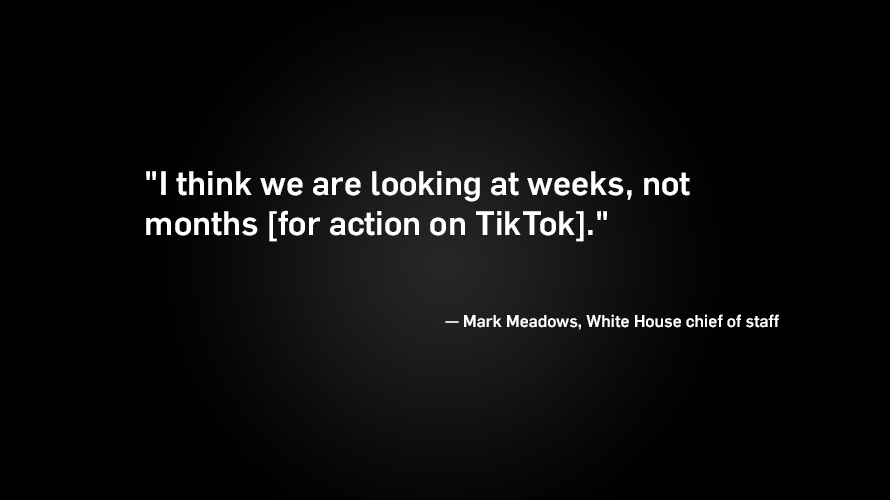TikTok has cemented its status as a regular part of Americans’ social media diets. It’s perhaps the only entity that’s been able to break through a space crowded by mammoth incumbents like Facebook and YouTube in recent years. But with astronomical growth comes commensurate scrutiny from regulators around the world, including the United States.
While U.S. bureaucrats and legislators have had their eye on TikTok, President Donald Trump himself has turned his own gaze to the app.
Last week, the Trump administration confirmed it was considering a ban of TikTok and said it would “take actions that preserve and protect [citizens’] information” from the Chinese government, according to Secretary of State Mike Pompeo.
“I don’t think there’s any self-imposed deadline for action, but I think we are looking at weeks, not months,” White House chief of staff Mark Meadows said Wednesday.
(TikTok says its parent company, ByteDance, is now headquartered in the Cayman Islands, not in China).

Given how much information the app collects from users—which is not much different than what U.S.-based social media companies collect—concerns abound over where that data is stored and what, if anything, is being shared with Beijing. TikTok claims data from its American users is kept in the U.S., although its privacy policy mentions that the company may share data with “a parent, subsidiary, or other affiliate of our corporate group.”
So, can the U.S. government actually ban TikTok? Experts told Adweek the answer is no, but the government does have ways it can make business much more difficult for the company.
Regulatory pressure mounts
In the past month, TikTok exited two foreign markets, one willingly and another unwillingly.
Amid escalating military tension with China, India banned TikTok and 58 other apps with ties to China on June 29, saying they “pose a threat to [the] sovereignty and integrity of India.” Days later, TikTok voluntarily withdrew from Hong Kong after officials there enacted a sweeping national security law that gives police authority to “take down internet posts” and punish internet companies’ employees if they don’t comply with data requests, The New York Times reported.
Tensions have also escalated in Australia, where politicians have called TikTok a national security threat.
In Washington, government scrutiny of TikTok reads like a laundry list.
Last year, the Federal Trade Commission fined TikTok $5.7 million for Children’s Online Privacy Protection Act violations by Musical.ly, the app ByteDance acquired and rebranded as TikTok, for collecting data from children under 13. And recent reports indicate the FTC is looking into whether TikTok violated its consent agreement.
In November, the Committee of Foreign Investment in the United States, a government body with the power to block or uncouple corporate mergers, announced an ongoing investigation into ByteDance’s 2017 $1 billion acquisition of Musical.ly.
And numerous government agencies, including State and Defense Departments, have barred employees from downloading the app on government phones. A Senate bill introduced by Sens. Josh Hawley, R-Mo., and Rick Scott, R-Fla., in March, would apply that same prohibition on all federal work devices.
In response to pressures in Washington, TikTok has bolstered its lobbying efforts, hiring 15 lobbyists since February and, during the first quarter of 2020, TikTok doubled its lobbying expenditures to $300,000, according to the Times.
While this sum pales in comparison to Facebook and Amazon, which each spent approximately $17 million in lobbying in 2019, it indicates that TikTok knows its biggest obstacle to success doesn’t lie in appealing to teenagers—it’s done that—but in convincing Washington it’s worthy of its trust.
What could the U.S. do?
There is no law that would allow Trump to completely ban TikTok, and it seems “unlikely that the government” would try to do so, said Kurt Opsahl, general counsel at Electronic Frontier Foundation. But regulators can force TikTok’s hand.
https://www.adweek.com/digital/can-the-u-s-government-actually-ban-tiktok/

